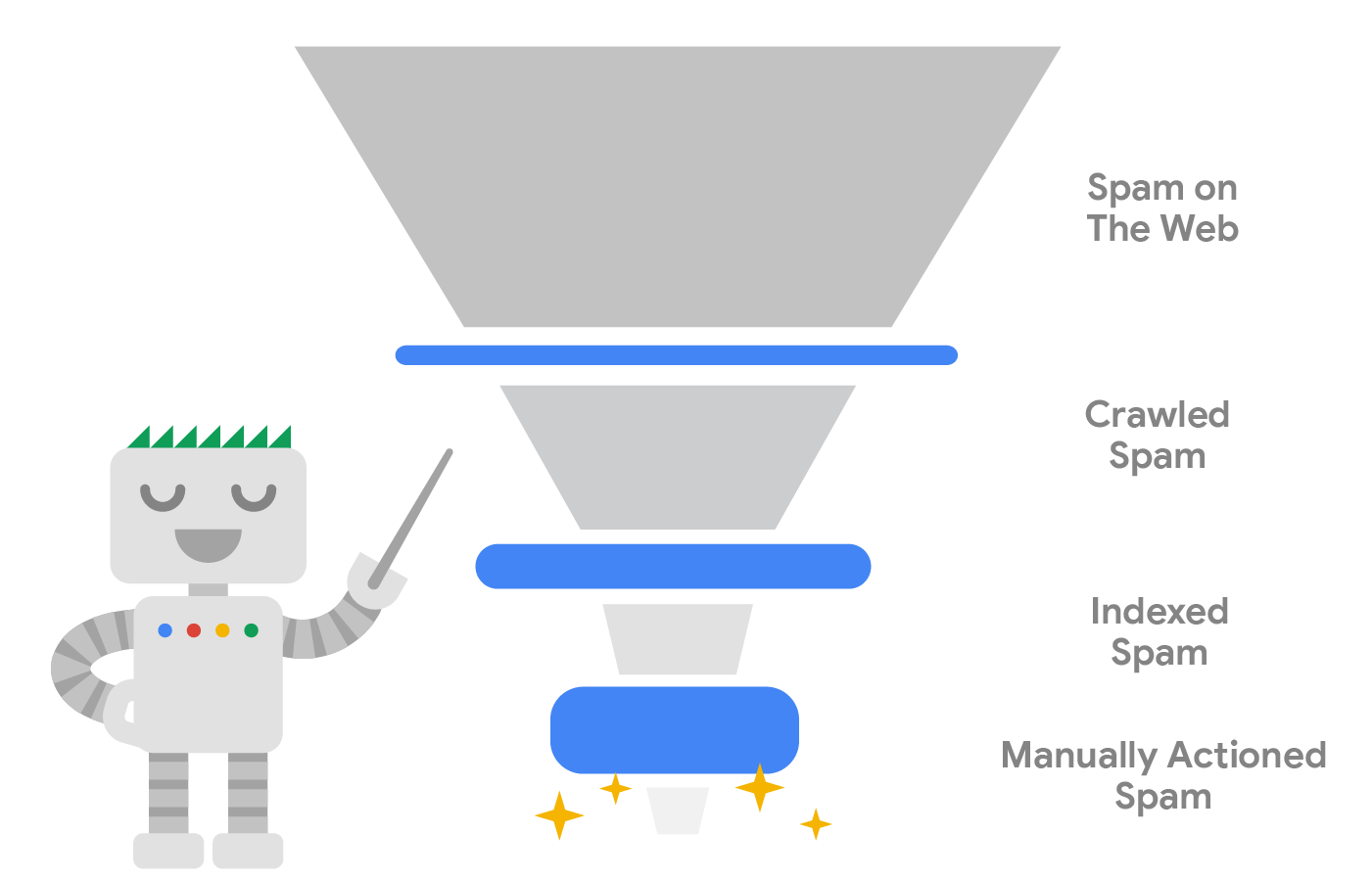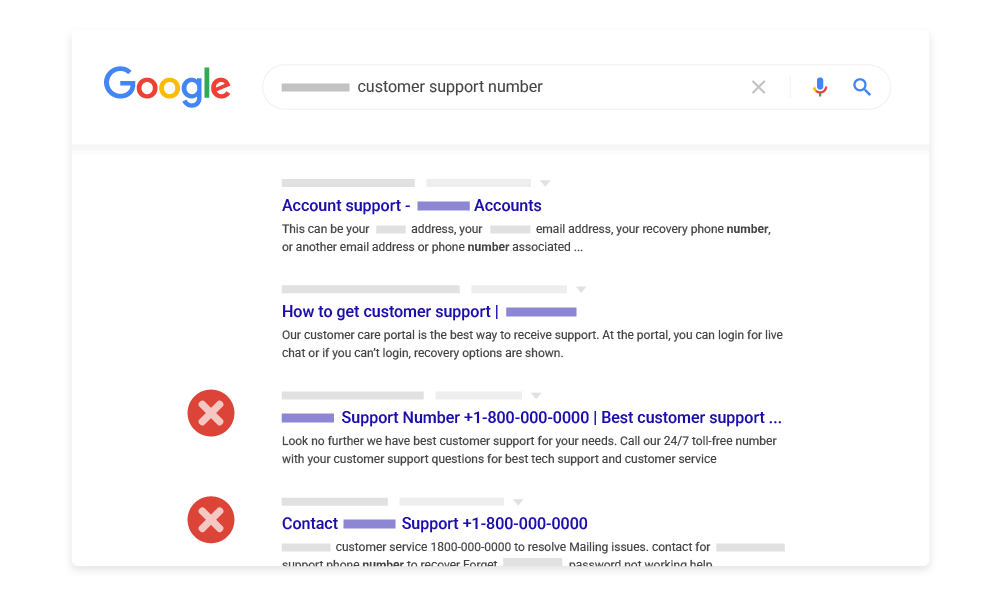2021 年 4 月 29 日星期四

Google 搜尋是一款功能強大的工具,可協助您在開放的網路環境中找到實用資訊。然而,並非所有的網頁都立意良善。許多網頁會明目張膽地欺騙使用者,而這正是我們每天面對的挑戰。為了確保您的安全,同時避免搜尋體驗受到干擾性內容和惡意行為侵擾,Google 搜尋於 2020 年投注許多心力,締造了不少創舉。
以更聰明的方式打擊垃圾內容
自 Google 搜尋問世以來,我們就一直在打擊垃圾內容,而近年來人工智慧 (AI) 的進步也帶來前所未有的可能性,讓我們能徹底革新舊有方式。
透過結合對垃圾內容的深入瞭解以及 AI,我們在去年建立了 Google 杜絕垃圾內容的 AI 技術,在掌握已知和最新的垃圾內容趨勢方面,都發揮了驚人的成效。舉例來說,我們致力於打擊內含自動產生和剪輯內容的網站,相較於幾年前總量減少超過 80%。
然而在 2020 年,儘管我們改良了偵測技術,讓成效提升超過 50%,還從搜尋結果中移除了大部分遭入侵的垃圾內容,這類內容仍舊相當猖獗,而有安全漏洞的網站數量也居高不下。
這不是我們單槍匹馬就能解決的問題。即使我們能偵測並防範所有垃圾內容,駭客還是會不斷利用安全性漏洞,除非我們將這類漏洞一一排除。不過,網站擁有者卻可以採取適當的安全措施來保護網站:比起將遭入侵的網站復原,直接防範駭客入侵網站是較為簡便的方式。您可以透過 Google 提供的資源瞭解有心人士入侵網站的常見方式,以及如何使用 Search Console 檢查網站是否遭到入侵。請確實詳閱以上內容,與我們一同打造安全的上網環境!
去年發生很多大事,包括全球爆發疫情,這促使我們投注大量心力,針對與這些重要主題相關的數十億筆搜尋結果提供額外保障。舉例來說,尋找附近的 COVID 檢測地點時,您不用擔心會看到胡言亂語的垃圾內容,也不用擔憂系統可能會將您重新導向網路詐騙網站。除了清除垃圾內容外,我們也與其他幾個搜尋團隊合作,確保您能在最關鍵的時空環境下,獲得最新且最優質的資訊。
避免接觸到垃圾內容
系統在 Google 上顯示一系列搜尋結果前,其實進行了許多幕後工作。我們每天都會尋找、檢索數十億個網頁並為其建立索引,而這些網頁中有許多垃圾內容;事實上,我們每天都會發現 400 億個垃圾資訊網頁。下文將說明我們如何確保您在搜尋實用資訊時,不會受到垃圾內容干擾。

首先,我們的系統會在檢索網頁或其他內容時偵測垃圾內容。所謂檢索,是指自動系統造訪內容的情況,此時系統會考慮將內容納入用來提供搜尋結果的索引之中。部分被偵測為垃圾資訊的內容則不會加進索引。
對於透過 Sitemap 和 Search Console 找到的內容,這些系統也會執行上述工作。舉例來說,Search Console 提供要求建立索引功能,方便創作者通知我們有新網頁需要盡快新增到索引中。我們的觀察顯示,垃圾內容發布者會入侵含有安全漏洞的網站,假裝是這些網站的擁有者,然後在 Search Console 中驗證他們的身分,並使用這項工具要求 Google 檢索他們建立的眾多垃圾資訊網頁,最後將其編入索引。但幸虧有 AI 協助,我們得以找出可疑的驗證作業,防止垃圾內容網址透過上述方法進入索引當中。
接下來,我們的系統會對索引涵蓋的內容進行分析。當您執行搜尋時,系統會重新檢查相符的內容是否可能含有垃圾內容。如果是的話,這些內容就不會顯示在熱門搜尋結果中。我們也會使用這類資訊來改善系統,避免將這些垃圾內容全數編入索引。
結果顯示,多虧了這套由 AI 輔助的自動化系統,使用者在熱門搜尋結果中實際看到的垃圾內容可說是少之又少。我們預估透過這些自動化系統,在經由搜尋而造訪網站的訪客中,有超過 99% 的人會完全不受垃圾內容干擾。至於剩下的極少部分,我們的團隊會採取專人介入處理,並善用這些處理經驗進一步改善自動化系統。
保護您不受垃圾內容以外的威脅干擾

除了垃圾內容外,我們也在 2020 年投入更多心力,協助防範其他類型的濫用行為,這當中有很多都可能造成重大財務和人身傷害。
我們在 2020 年大幅改善服務涵蓋範圍,保護更多使用者不受線上詐騙和詐欺侵害。線上詐騙手法千變萬化,比起傳統的網路垃圾內容,可能會以更多樣的方式帶來負面影響。舉例來說,許多詐騙份子會假借熱門服務和產品的名義提供客戶服務的電話號碼,為的只是要誘騙使用者透過銀行轉帳或禮物卡付款給他們。這類詐騙行為通常稱為「客戶服務詐騙」或「技術支援詐騙」,目前已有數十萬名使用者檢舉這個手法。不論是以上哪種方式,使用者都可能因詐騙份子而損失數百美元的錢財。

從 2018 年開始,我們的系統就有能力偵測潛藏詐騙風險的網站,因此每年可以為數億筆的搜尋作業提供防護。在網路上,詐騙份子會利用濫填關鍵字、模仿的品牌標誌,甚至是您要撥打的電話號碼,設法建立許多品質低劣的網站。但透過我們的演算法解決方案,詐騙和詐欺內容出現在搜尋結果中的機會就變得微乎其微,而這只是我們去年為了確保搜尋結果品質和您的安全,推出的其中一種保護措施而已!我們的首要之務是克服挑戰,為您提供最可靠的結果;當然另一方面,您也可以隨時留意相關資訊並瞭解詐騙手法,進一步保護自己。
AI 進步的另一個有利面向,是對網站內容的理解。關於這點,可從我們如何協助改良對產品評論、資訊及購物網站的排名方式窺見一斑。在您購買產品之前,Google 搜尋是研究與尋找產品的絕佳管道。藉由獎勵提供更深入研究和實用資訊的內容,我們希望確保您在下次購物時,能夠獲得最實用的資訊。
儘管我們在杜絕垃圾內容方面獲得重大進展,垃圾內容發布者卻也十分積極開發可躲避偵測的最新技術。因此我們不斷精益求精,致力保護使用者免受新型濫用行為的侵擾,而外部報告也能提供協助。您最近使用 Google 搜尋服務時,曾感到搜尋結果有誤導、詐騙之虞,或提供垃圾內容嗎?您是否認為我們可以改善服務,有效杜絕這些情況?如果是的話,歡迎透過垃圾內容報告提供意見回饋,並附上問題和任何其他可能有用的資訊。

